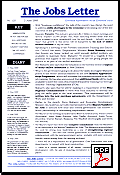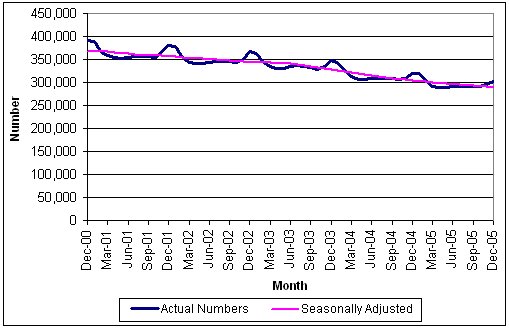



|
 |

|
| No.246 | 9 February 2006 | Essential Information on an Essential Issue |
of key events over the last few weeks. JOB LOSSES BLAMED ON HIGH DOLLAR CORPORATE WELFARE OR SOCIAL INVESTMENT? EVALUATION OF THE “JOBS MACHINE” HIGHER MINIMUM WAGE CAMPAIGN BENEFIT NUMBERS STILL FALLING WANANGA AXES BUILDING TRAINING SKILLED MIGRANT CRITERIA SEEMS TO BE WORKING WORLDWIDE NEONATAL NURSING SHORTAGE IT SKILLS SHORTAGE LINDA CLARK ON DAWN TO DUSK CHILDCARE OZ TACKLES WORKFORCE PARTICIPATION OZ PROPOSALS TO BOOST TRADE TRAINING ILO JOB STRATEGIES  LAST Letter
LAST Letter
NEXT Letter   Download this issue as a PDF file
Index to Features
18 January 2006Referrals to foodbanks from social agencies such as Work and Income and hospitals increased 38% last year. Christchurch City Mission says demand for food parcels is exceeding supply and up to 40 people a day are going away from the foodbank empty handed. 19 January 2006The Indian IT sector it is facing massive skill shortages. Ganesh Natarajan of Zensar Technologies estimates the shortage of solution architects, specialists with domain skills, designers and analysts in India may be as many as half a million workers by 2010. He encourages Indian universities to tailor their curricula around the looming need. 21 January 2006Low-income earners are to be given an opportunity to buy a stake in their homes. The government is providing $6.7m to Housing NZ Corporation to introduce a scheme in which the state takes a share of equity in a property and eventually the buyer would buy out the state's share. 22 January 2006South Auckland export beef jerky manufacturer Jack Links announces it will lay off 102 workers. The company is retraining about 50 staff to supply the local market. The Irish government plans to launch a green card system to allow foreign students — many from non-European countries — to stay on in Ireland and work after they finish their studies. 23 January 2006Oil company BP warns that another year of terrorism threats and political instability in oil producing countries will hit the NZ economy hard, especially if the dollar weakens. The cost of buying a house in NZ's three main metropolitan areas is rated as "severely unaffordable" by the Demographica International Housing Affordability Survey: 2006. The survey rates the cost of houses against local incomes in all the major urban areas in Australia, Canada, Ireland, NZ, the UK and the US. It can be downloaded (35pg, 618Kb) from here. Canterbury Sheepskin product manufacturer and exporter GL Bowron cuts 75 jobs. Secretary Jim McBryde says the high NZ dollar and increased competition from low labour cost countries such as China has affected the company's sustainability. Uncertainty in the labour market is making casual workers more attractive to employers. Labour hire firm Allied Work Force says demand for casual workers in December was up 10% on the previous year. All 35 workers at a Pacific Plastics Recyclers factory are to be kept on after fire destroyed their workplace. The Otaki firm has two other factories in the Horowhenua town and staff are being re-deployed until a new factory is built. Motorists and freight firms are hit by the steepest fuel-price rise of recent months — 6c per litre for both petrol and diesel. The rises are blamed on an intensifying militant campaign against foreign oil companies in Nigeria and rising tensions over Iran's nuclear programme. The price of oil has risen more than $US10 per barrel in one month and is now selling at nearly $US70 per barrel. 24 January 2006A Wellington-based manufacturer is to produce a plastic pallet in China rather than make it in its Stokes Valley factory. Calvert Plastics co-owner John Matthews says he can buy the finished product in China for the price of the raw materials in NZ. The market for the pallet is in the US. Ford will cut 30,000 jobs in North America and close 14 factories by 2012. The car manufacturer is also investing millions of dollars in the Piquette Project with the intent of producing a hybrid car from both recycled and biodegradable materials. 25 January 2006Green MP Sue Bradford pledges half her last year's back pay to the SuperSizeMyPay.com campaign aimed at increasing the minimum wage to $12 an hour. The NZ arm of international IT services giant EDS has exceeded its job creation target. EDS NZ received $1.5 million in government funding by promising to create 360 local jobs within two years. The company had created 383 jobs by the end of 2005. Cutting costs is no longer the sole purpose for globalisation, according to accounting firm PricewaterhouseCooper. Chief executive Samuel DiPiazza: "The economies of Brazil, Russia, India and, or course, China were once seen primarily as sources of low-cost production. However, they now represent substantial growth opportunities for multinational and locally-based companies and at the same time are producing a new crop of serious global competitors." 26 January 2006A human bird flu pandemic could ground up to 70% of the worlds' aircraft, warns Virgin Group boss Richard Branson. The only positive result would be a fall in fuel costs. Branson: "It will certainly bring down oil prices with a thump." McDonalds fast food restaurants in parts of Britain are pioneering the use of a "family contract" which allows husbands, wives, grandparents and children over age 16 to job-share and swap shifts without notifying management. A UN report predicts the NZ economy will grow 2% this year, while it forecasts world economic growth to be 3%. World Economic Situation and Prospects says the NZ economy has already slowed mainly due to the high dollar, as well as a low savings rates and high interest rates. It concludes that houses prices are at unsustainable levels and many households are vulnerable to falls in house prices. 27 January 2006International trade unions meet with UN secretary general Kofi Annan to discuss the increasing engagement of the UN on the issue of international migration. The meeting agrees there is the need for a strong UN role in pushing for effective international action on rights for migrant workers and the need for economic development and job creation in so-called "sending countries". 28 January 2006Timaru is touting for welders, plumbers, electricians, builders and carpenters who are also talented senior rugby players. The South Canterbury Rugby Union has placed advertisements in Auckland newspapers for rugby playing tradesmen. The union has approached local firms to provide the jobs — but demands to be first in the queue for a player contract if the firms hire any applicants with senior rugby ability. The increase to the minimum wage from $9.50/hr to $10.25/hr will cost the aged residential care sector an estimated $31m/yr. Healthcare Providers NZ says the government will need to boost funding to the sector to cover the higher wage costs. The drop in international prices for lamb and beef products may slash dry stock farm incomes by $30,000 this year. Lamb prices are down 20% over last year, pelt prices are down 30% and beef prices are expected to drop in 2006. All three major meat companies — PPCS, Affco and Alliance — warn of lower prices due to falling commodity prices and anticipated falls in the NZ dollar. 29 January 2006The Maori Party is to launch a "continued attack on poverty". Co-leader Sharples says there is too much dependency on welfare in Maoridom and that policies need to be found that empower families and allow families to be strong in themselves, to look after their own and not to have to rely on a whole stream of welfare-type handouts. Sharples: "It's like a kid — if you keep giving your kids everything, at the end of the day they don't have the skills and knowledge to do it themselves." 30 January 2006Air NZ and engineering unions reach an agreement that could retain the airline's heavy maintenance base at Auckland and about 300 jobs. NZ household borrowing is up 15.3% on what it was a year ago. Mortgages account for $120.5 billion of the $131.5 billion NZ consumers now owe. BNZ economist Stephen Toplis warns that the household sector won't stop spending until people started fearing for their jobs. 1 February 2006Christchurch Hospital has been forced to cancel surgery for about 20 patients this month because it has been unable to recruit anaesthetic technicians and theatre nurses. The hospital has been advertising the vacancies for months. A fall in Japanese tourist numbers has resulted in Air NZ abandoning its Auckland to Nagoya flight. Some flights to Taipei will also cease due to falling passenger numbers. A twice-weekly service between Christchurch and Los Angeles will also be suspended from April to October. 2 February 2006The official unemployment rate in Palestine is 22% and half of Palestinians live in poverty, according to Reuters. In Gaza, many Palestinians live on an average of $2 a day.
 LAST Diary
LAST Diary
NEXT Diary 
|
JOB LOSSES BLAMED ON HIGH DOLLAR Recent job losses in the manufacturing sector are being blamed on the high New Zealand
dollar. Rotorua wood products manufacturer PanaHome is laying off 112 staff, Christchurch sheepskin
product exporter GL Brown is laying off 75 staff and South Auckland beef jerky manufacturer Jacks Links
is laying off 102 staff. Jack Links chief John Corner says the problem for manufacturing is the high
dollar. When his factory opened four years ago the New Zealand dollar was at $US.40. Corner: "Now it
is sitting at $US.70 and has been for some time, which makes it impossible for us to compete
with manufacturers in South America." Recent job losses in the manufacturing sector are being blamed on the high New Zealand
dollar. Rotorua wood products manufacturer PanaHome is laying off 112 staff, Christchurch sheepskin
product exporter GL Brown is laying off 75 staff and South Auckland beef jerky manufacturer Jacks Links
is laying off 102 staff. Jack Links chief John Corner says the problem for manufacturing is the high
dollar. When his factory opened four years ago the New Zealand dollar was at $US.40. Corner: "Now it
is sitting at $US.70 and has been for some time, which makes it impossible for us to compete
with manufacturers in South America."
Canterbury Employers Chamber of Commerce chief Peter Townsend says manufacturers are being hit twice by the strong dollar. Not only are they unable to make a profit with their exports because the exchange rate eliminated margins, but they are also competing in the domestic market against imports that are cheaper for New Zealand consumers. Townsend: "My prediction would be that we're in for a pretty rough spin in the productive sectors of our economy over the next six months."
 Minister of Finance Michael Cullen says the recent job losses are "the unfortunate
consequence of six years of consistently strong economic growth" and this growth has been partially driven by
the high dollar. But Cullen doesn't appear to be overly concerned about the recent job losses, pointing
out that most commentators are forecasting only a modest economic slowdown and a continuing
strong labour market. Cullen predicts unemployment to rise to 3.8% by the end of the year — which
equates to about 8,000 lost jobs. Cullen: "There's no trend here of massive layoffs. There will be a slowdown
in the rate of growth in the economy. It will be a modest rate of slowdown." Minister of Finance Michael Cullen says the recent job losses are "the unfortunate
consequence of six years of consistently strong economic growth" and this growth has been partially driven by
the high dollar. But Cullen doesn't appear to be overly concerned about the recent job losses, pointing
out that most commentators are forecasting only a modest economic slowdown and a continuing
strong labour market. Cullen predicts unemployment to rise to 3.8% by the end of the year — which
equates to about 8,000 lost jobs. Cullen: "There's no trend here of massive layoffs. There will be a slowdown
in the rate of growth in the economy. It will be a modest rate of slowdown."
Oram also says over the past few years New Zealand manufacturers have been investing in more sophisticated machinery and skilled staff rather than depending on a surplus of low-paid, low-skilled workers. The result could be that a lift in productivity is on the cards. Oram: "The upsurge in capital investment began in mid-2004, in part a response to a seriously tightening labour market and a high dollar that made imported machinery relatively cheap. It began to fade away in the second half of last year, but enough new investment has happened to suggest we will see a significant increase in productivity this year." Source — New Zealand Herald, 24 January 2006, "Jobs lost as high dollar hits exporters" by Georgina Bond; The Press, 25 January 2006, "Cuts not our fault _ Govt" by Colin Espiner; Dominion Post, 27 January 2006, "Cullen admits jobless gaffe" by Vernon Small; Fairfax NZ, 25 January 2006, "Politicians trade blows over dollar and redundancies" by Marta Steeman; media release National Party John Key, 24 January 2006, "Another firm closes - more bad news for Govt"; Sunday Star Times, 5 February 2006, "Don't believe Dr Doom" by Rod Oram.
CORPORATE WELFARE OR SOCIAL INVESTMENT? The loss of jobs at Jack Links is sad for the 102 people affected, but the taxpayer has also
lost out, according to National Party economic development spokesperson Katherine Rich. She accuses
the government of providing $550,000 of "corporate welfare" for Jack Links in 2002 when it was
touting the company as a key example of its "jobs machine". Rich: "The government paid for a feasibility
study through Industry NZ worth $50,000 and Industry NZ also underwrote the assistance of Work
and Income to the tune of $500,000." Rich says it is unfair to other companies that the government tries
to pick winners through its Industry NZ schemes. She says the business environment should be
conducive for all businesses — not "just an anointed few". The loss of jobs at Jack Links is sad for the 102 people affected, but the taxpayer has also
lost out, according to National Party economic development spokesperson Katherine Rich. She accuses
the government of providing $550,000 of "corporate welfare" for Jack Links in 2002 when it was
touting the company as a key example of its "jobs machine". Rich: "The government paid for a feasibility
study through Industry NZ worth $50,000 and Industry NZ also underwrote the assistance of Work
and Income to the tune of $500,000." Rich says it is unfair to other companies that the government tries
to pick winners through its Industry NZ schemes. She says the business environment should be
conducive for all businesses — not "just an anointed few".
 The former Minister of Economic Development Jim Anderton agrees the $500,000 was
a successful investment in training of the long-term unemployed people. Anderton says the same
150 people had been receiving benefits averaging around $250 per week — and were costing the
taxpayer nearly $2 million per year. Had they not worked at the company for the last three years they would
have been paid about $6 million in benefits. Anderton: "I am certain that the last three - four years
of employment for those who got the initial training for work at the Jack Links plant will not be
wasted. These Kiwis will have gained useful skills and work habits. They will have paid taxes and their
children will have dads and mums who go to work as role models. They now face a work environment that is
as close to a full employment situation as we have seen in New Zealand's living memory and they will
be more confident in their ability to approach the job market than if they were still on the
unemployment benefit four years down the track." The former Minister of Economic Development Jim Anderton agrees the $500,000 was
a successful investment in training of the long-term unemployed people. Anderton says the same
150 people had been receiving benefits averaging around $250 per week — and were costing the
taxpayer nearly $2 million per year. Had they not worked at the company for the last three years they would
have been paid about $6 million in benefits. Anderton: "I am certain that the last three - four years
of employment for those who got the initial training for work at the Jack Links plant will not be
wasted. These Kiwis will have gained useful skills and work habits. They will have paid taxes and their
children will have dads and mums who go to work as role models. They now face a work environment that is
as close to a full employment situation as we have seen in New Zealand's living memory and they will
be more confident in their ability to approach the job market than if they were still on the
unemployment benefit four years down the track."
Source — Media release National Party Katherine Rich, 24 January 2006, "Taxpayer helped subsidise ailing beef jerky plant"; media release NZ government Jim Anderton, 25 January 2006, "National needs to do the maths"; National Business Review, 25 January 2006, "Rich goes toe-to-toe with Mallard, Anderton over Jack Links."
EVALUATION OF THE "JOBS MACHINE"The "jobs machine" has drawn a lot of attention over the years, including claims it sidelined Maori businesses, that it focused too heavily on Auckland-based businesses and lacked a clear focus. In 2004, an auditor-general's report into schemes administered by New Zealand Trade and Enterprise was highly critical of the way it had handled millions of dollars in grants. It uncovered missing paperwork, loose controls on spending and breaches of Cabinet guidelines. Source — Dominion Post, 4 February 2006, "`Jobs machine' under review" by Haydon Dewes.HIGHER MINIMUM WAGE CAMPAIGN The Unite Union has launched a local "Make Poverty Wages History" campaign in support
of the Minimum Wage (Abolition of Age Discrimination) Amendment Bill. The campaign is
encouraging people to lobby MPs to vote to send the Bill to a Select Committee after it is first debated in
parliament this month. Passage of the Bill would see the adult minimum wage apply to all workers older than
15 years. The campaigners are asking people to lobby the Labour Party, the Maori Party, United
Future and NZ First to join with the Green Party in voting to send the bill to committee. The Unite Union has launched a local "Make Poverty Wages History" campaign in support
of the Minimum Wage (Abolition of Age Discrimination) Amendment Bill. The campaign is
encouraging people to lobby MPs to vote to send the Bill to a Select Committee after it is first debated in
parliament this month. Passage of the Bill would see the adult minimum wage apply to all workers older than
15 years. The campaigners are asking people to lobby the Labour Party, the Maori Party, United
Future and NZ First to join with the Green Party in voting to send the bill to committee.
The campaign is also joining forces with SuperSizeMyPay.com which is calling for the minimum wage to be raised to $12 per hour. Co-ordinator Simon Oostermann says a broad range of community groups are adding their voices to the call for all workers to be paid a liveable wage. Oostermann: "Community groups are joining the fast food workers' call for McDonalds, Burger King, KFC, Starbucks and Pizza Hut, to take social responsibility for the welfare of their workers, their families and the wider community. As the biggest brands, these companies set the wage standards for the entire industry and are in a key position to play a major role in making poverty wages history in New Zealand."
 The Council of Trade Unions (CTU) is one of the organisations supporting both the
"Make Poverty Wages History" campaign and SuperSizeMyPay.com. President Ross Wilson: "Poverty
only exists in New Zealand as long as we continue to tolerate it. The low wages that far too many
New Zealand workers are paid has a direct impact on thousands of poor families, and contributes to
our unacceptable rates of child poverty. The CTU also supports the removal of the age differential for
the minimum wage by scrapping youth rates. We support fair pay for a fair day's work, and we
look forward to campaigning alongside other community groups this year for the abolishment of youth
rates and a speedier increase in the minimum wage to $12 per hour." The Council of Trade Unions (CTU) is one of the organisations supporting both the
"Make Poverty Wages History" campaign and SuperSizeMyPay.com. President Ross Wilson: "Poverty
only exists in New Zealand as long as we continue to tolerate it. The low wages that far too many
New Zealand workers are paid has a direct impact on thousands of poor families, and contributes to
our unacceptable rates of child poverty. The CTU also supports the removal of the age differential for
the minimum wage by scrapping youth rates. We support fair pay for a fair day's work, and we
look forward to campaigning alongside other community groups this year for the abolishment of youth
rates and a speedier increase in the minimum wage to $12 per hour."
Source — Media release Unite Union, 23 January 2006, "Panel Calls on Community to Make Poverty Wages History"; email from Ivan Sowry, 3 February 2006, "Action Alert! Social Security (Abolition of Age Discrimination) Amendment Bill - Urgent Action required"; media release Unite Union, 24 January 2006, "Bradford First MP to Donate to Low Paid Workers"; media release NZ Council of Trade Unions, 25 January 2006, "$12 min wage needed sooner rather than later".
BENEFIT NUMBERS STILL FALLING Ministry of Social Development figures show that the total number of people receiving all
types of benefit dropped by 17,616, or 6% in the 12 months to December 2005. And since December
2000, the total number of people receiving any kind of benefit dropped by 25% — from 401,415 to 302,083. Ministry of Social Development figures show that the total number of people receiving all
types of benefit dropped by 17,616, or 6% in the 12 months to December 2005. And since December
2000, the total number of people receiving any kind of benefit dropped by 25% — from 401,415 to 302,083.
Minister of Social Development and Employment David Benson-Pope says the decrease in the number of unemployment benefits has been a key driver behind the overall drop in beneficiary numbers. Over the last 12 months, the number of unemployment benefits being paid out dropped by 14,543 or 22%. Benson-Pope: "Since 1999 we've seen 110,000 fewer people in receipt of unemployment benefits — dropping from 161,000 in 1999 to just over 51,000 in December 2005. That's a drop of nearly 70%." It's not just the Pakeha/European figures that have fallen. The number of Maori in receipt of an unemployment benefit has also dropped. There were 4,033 fewer Maori in receipt of an unemployment benefit over the year to December 2005. And since 2000 the number of Maori receiving the unemployment benefit declined from 44,378 to 18,655, a drop of 58%. The number of Pacific people on the unemployment benefit dropped 18% last year. There were more than 12,000 Pacific people on unemployment benefits in 2000 and this has reduced to 4,075. The Ministry figures also show that the number of people receiving the domestic purposes benefit has decreased 3% or 3,037 people over the year to 106,302. 
Total number of benefits paid out. Source: Ministry of Social DevelopmentSource — Media release NZ Government David Benson-Pope, 1 February 2005, "Unemployment benefit numbers drop by 22% in 2005"; Media Release NZ government, 2 February 2006, "17.8 percent drop in Maori unemployment"; Fairfax NZ, 1 February 2006, "Beneficiary numbers down in past year " by NZPA; Newswire.co.nz, 4 Feb 2006 Big Drop In Pacific Unemployment. WANANGA AXES BUILDING TRAINING Te Wananga o Aotearoa has axed its pre-apprentice carpentry and building skills
courses. Former Wananga trades school head Ropata Stephens says the school averaged about 60 students
per year with nearly half of the graduates going into apprenticeships and a further third into
industry-related jobs. However, the cost of running the pre-trade course was high and it had become an uphill
struggle to maintain numbers over the entire year. Stephens says too many students would leave the
course before they completed it because they were offered jobs — not necessarily as on building sites —
and the course could not cover its costs with the reduced numbers. Te Wananga o Aotearoa has axed its pre-apprentice carpentry and building skills
courses. Former Wananga trades school head Ropata Stephens says the school averaged about 60 students
per year with nearly half of the graduates going into apprenticeships and a further third into
industry-related jobs. However, the cost of running the pre-trade course was high and it had become an uphill
struggle to maintain numbers over the entire year. Stephens says too many students would leave the
course before they completed it because they were offered jobs — not necessarily as on building sites —
and the course could not cover its costs with the reduced numbers.
Te Wananga acting operations manager John Mote says the decision to close the pre-apprenticeship courses was partly financial but mostly because not enough people enrolled in them. Mote says young people preferred to join an apprenticeship programme and earn wages, rather than train for up to three years in order to gain the same skills. Mote: "We're certainly not abandoning the challenge of trades training. There's just been a change in the way young people want to train in the industry." Source — Sunday Star Times, 29 January 2006, "Wananga up the financial creek _ but it still has paddles" by Tara Ross.SKILLED MIGRANT CRITERIA SEEMS TO BE WORKING Changes to the government's Skilled Migrant Category (see
Jobs Letter No 245) seem to be working. The level of points — based on skills, qualifications and experience — needed by
skilled migrant applicants in order to be automatically selected to immigrate was raised for people who
didn't have a New Zealand job offer. But in December, 910 people who didn't have enough points to
make their selection automatic were "invited to apply" to immigrate on the basis they had been offered a
job. A year earlier only half that number of people who applied as skilled migrants had job offers. Minister
of Immigration David Cunliffe says the indication is that Ministry is getting the kind of applicants
New Zealand employers need. Changes to the government's Skilled Migrant Category (see
Jobs Letter No 245) seem to be working. The level of points — based on skills, qualifications and experience — needed by
skilled migrant applicants in order to be automatically selected to immigrate was raised for people who
didn't have a New Zealand job offer. But in December, 910 people who didn't have enough points to
make their selection automatic were "invited to apply" to immigrate on the basis they had been offered a
job. A year earlier only half that number of people who applied as skilled migrants had job offers. Minister
of Immigration David Cunliffe says the indication is that Ministry is getting the kind of applicants
New Zealand employers need.
The National Party calls the increased emphasis on job offers a positive move. Spokesperson Lockwood Smith says there had previously been too much weight placed on paper qualifications rather than employability. But Smith is yet to be convinced that the government has its skilled immigration policy right and says it will take time to see if the criteria are correct. Smith: "Instead of being a measure of employability, it could be a measure more of the desperation of employers." Source — Media release, NZ government David Cunliffe, 2 February 2006, "Talented migrants targeted in selection process"; Dominion Post, 3 February 2006, "More migrants in skilled work" by Rebecca Palmer.
NEONATAL NURSING SHORTAGES Neo-natal units in New Zealand hospitals are increasingly looking overseas to recruit
specialist nurses. Middlemore general manager of the children's unit and women's health Nettie Knetsch
says recruiting overseas is not only due to the demands presented by a new infant intensive care unit
being opened at the hospital but is an ongoing strategy due to the general shortage of delivery and
neonatal staff nationwide. Neo-natal units in New Zealand hospitals are increasingly looking overseas to recruit
specialist nurses. Middlemore general manager of the children's unit and women's health Nettie Knetsch
says recruiting overseas is not only due to the demands presented by a new infant intensive care unit
being opened at the hospital but is an ongoing strategy due to the general shortage of delivery and
neonatal staff nationwide.
The New Zealand Medical Association warns, however, that recruiting specialists off-shore is a short-term and short sighted solution. Deputy chairperson Don Simmers says recruiting foreign-trained specialists will not remain an option for much longer because the shortage exists not only in New Zealand but throughout the world. Simmers: "New Zealand has relied for too much on that in the past but we are now going through a worldwide shortage of medical staff. We've really got to grow our own and to have a much more sustainable workforce." Source — Dominion Post, 25 January 2006, "Understaffed neonatal units threatening baby safety" by Rebecca Quillian.IT SKILLS SHORTAGESource — Media release, Unisys, 12 January, 2006, "Talent shortage becomes real business issues in 2006".LINDA CLARK ON DAWN TO DUSK CHILDCARE Retiring National Radio NZ Nine to
Noon host Linda Clark — a mother of young children
— is unenthusiastic about pushing mothers into the workforce. Clark says that she may have been
seen by many as a role model for working women but she says mixing motherhood and her full-time job
had been too difficult. Clark says that women who look like they are managing to do it all — as
she appeared to — aren't helpful to other women. Clark: "For a start, we are not managing often and it
simply increases the expectation that the impossible is possible." Retiring National Radio NZ Nine to
Noon host Linda Clark — a mother of young children
— is unenthusiastic about pushing mothers into the workforce. Clark says that she may have been
seen by many as a role model for working women but she says mixing motherhood and her full-time job
had been too difficult. Clark says that women who look like they are managing to do it all — as
she appeared to — aren't helpful to other women. Clark: "For a start, we are not managing often and it
simply increases the expectation that the impossible is possible."
Clark says policy makers tend to frame the work/life balance issues as one that primarily entails more childcare. She says the real answer will only come from redefining work so that women can feel they are achieving and be perceived as achievers without having their kids "parked eternally elsewhere". Clark: "All last year I kept mulling over that nonsense Helen Clark said about getting women out working, and dawn-to-dusk childcare. That was so enraging. We were inundated on the programme with women who were furious about that. No one who has had their child in dawn-to-dusk childcare would ever recommend it for anybody. Everybody in the family suffers. Yes, we want to work and have our careers, but workplaces have yet to come to terms with what working and mothering means when they occur side by side." Source — N Z Listener, 28 January 2006, "A New Morning" by Joanne Black.OZ TACKLES WORKFORCE PARTICIPATION The Australian government has created a new ministerial position for Workforce
Participation. The inaugural minister Sharman Stone will be responsible for overseeing a controversial $3
billion welfare-to-work package that the Sydney Morning
Herald characterises as aimed at "getting the
sick and single back into the workforce". The appointment comes after an opposition politician
recently sparked a national debate about childcare by slamming the funding system as "a shambles". The Australian government has created a new ministerial position for Workforce
Participation. The inaugural minister Sharman Stone will be responsible for overseeing a controversial $3
billion welfare-to-work package that the Sydney Morning
Herald characterises as aimed at "getting the
sick and single back into the workforce". The appointment comes after an opposition politician
recently sparked a national debate about childcare by slamming the funding system as "a shambles".
Stone says working mothers are desperately needed to help overcome Australia's skills shortage. Stone, a mother of three who has always worked outside the home, says she is aware that the needs of working parents and these — including childcare — are her top priority. She says it's time for the government to look at bold policy options to solve the childcare crisis. Stone: "Childcare is intimately and integrally related to the capacity of people to re-enter the workforce, whether they be single parents or a couple." Source — The Sun-Herald, 29 January 2006, Bold child-care policy needed to overcome skills shortage by Kerry-Anne Walsh.OZ PROPOSALS TO BOOST TRADE TRAINING The Australian Labor opposition has unveiled its proposal to tackle the country's chronic
trade skill shortages. Leader Kim Beazley says his party would cap TAFE (polytechnic) fees for
trades apprentices at $800 and then provide every new apprentice starting a traditional trade with a
"skills account" of $800 each year to cover the cost of tuition fees and textbooks. On top of the
taxpayers subsidy, some employers would also be forced to contribute to their apprentices' skills accounts.
Any funds left over after the apprentice comes out of their time could only be used for future skills
upgrades. Beazley says the blueprint would cost $170 million annually and he believes would produce
an additional 13,000 qualified tradespeople each year — making a big dent in the shortfall of
carpenters, welders, plumbers, motor mechanics, electricians, chefs and hairdressers. The Australian Labor opposition has unveiled its proposal to tackle the country's chronic
trade skill shortages. Leader Kim Beazley says his party would cap TAFE (polytechnic) fees for
trades apprentices at $800 and then provide every new apprentice starting a traditional trade with a
"skills account" of $800 each year to cover the cost of tuition fees and textbooks. On top of the
taxpayers subsidy, some employers would also be forced to contribute to their apprentices' skills accounts.
Any funds left over after the apprentice comes out of their time could only be used for future skills
upgrades. Beazley says the blueprint would cost $170 million annually and he believes would produce
an additional 13,000 qualified tradespeople each year — making a big dent in the shortfall of
carpenters, welders, plumbers, motor mechanics, electricians, chefs and hairdressers.
Beazley also believes current Australian labour policy is too dependent on inviting in skilled migrants rather than training young Australians. He says since 1996 the government has accepted 270,000 skilled migrants but has turned away 300,000 Australians from TAFE training because there were insufficient training places. Source — The Age, 30 January 2006 "Labor revives Whitlam-era policy to tackle skills shortage" by Misha Schubert.
ILO JOB STRATEGIES The world economy needs to add 40 million jobs annually just to employ the people
who are entering the labour market — and it's not doing it. The UN International Labour Organization
(ILO) says this global jobs crisis is one of the biggest security risks the world faces. Director-general
Juan Somavia told leaders at the World Economic Forum in Davos, Switzerland, that the growing jobs
crisis threatens democracies around the globe and he urges leaders to take concrete steps to tackle
a problem that threatens to create a more fragmented, protectionist and confrontational world.
Somavia: "It is time to revisit the commitments made by the global community to promote social inclusion
and jobs as the basis of poverty reduction, and respect for fundamental principles and rights at work." The world economy needs to add 40 million jobs annually just to employ the people
who are entering the labour market — and it's not doing it. The UN International Labour Organization
(ILO) says this global jobs crisis is one of the biggest security risks the world faces. Director-general
Juan Somavia told leaders at the World Economic Forum in Davos, Switzerland, that the growing jobs
crisis threatens democracies around the globe and he urges leaders to take concrete steps to tackle
a problem that threatens to create a more fragmented, protectionist and confrontational world.
Somavia: "It is time to revisit the commitments made by the global community to promote social inclusion
and jobs as the basis of poverty reduction, and respect for fundamental principles and rights at work."
Somavia advocates a shift in economic and social policies to put decent work at the centre of national and international development efforts. He says such steps would help lift tens of millions of people out of the poverty of unemployment. The expansion of training and education, especially for young people, is another crucial step. The ILO estimates that young people age 15 - 24 make up about half — or 86 million — of the world's unemployed. Somavia: "If we can reduce the youth unemployment rate by just half, we will add at least $2.2 trillion to the global economy." Source — Media release , 27 January 2006, UNILO, "Global jobs crisis threatens stability, UN labour agency chief warns leaders in Davos".We are funded by sustaining grants and donations. Yes, you can help.
|